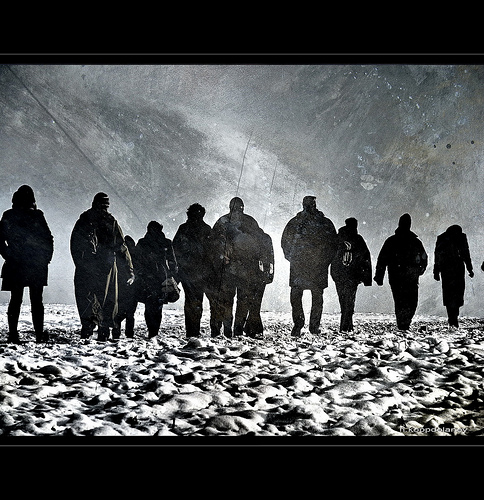NOT YOUR STORY

At the end of John’s Gospel, we learn of a conversation between Jesus and Peter about how Peter’s life will end. Jesus said this to Peter: “Truly, truly, I say to you, when you were young, you used to dress yourself and walk wherever you wanted, but when you are old, you will stretch out your hands, and another will dress you and carry you where you do not want to go” (John 21:18). We learn then that Jesus was instructing Peter that he would die by crucifixion, like his master Jesus (we learn from church history that this is what happened, in fact, Peter asked to be crucified upside down because he did not think he was worth to die the same way as Jesus).
Jesus tells Peter to “follow me” (John 21:19). And this was his task: to follow Jesus no matter where it took him and no matter what it cost him. Yet, this didn’t stop Peter from asking about how John, another of the disciples, would die: “Peter turned and saw the disciple whom Jesus loved following them, the one who also had leaned back against him during the supper and had said, “Lord, who is it that is going to betray you?” 21 When Peter saw him, he said to Jesus, “Lord, what about this man?” (John 21:20-21).
Jesus’ response to Peter’s question is this: “If it is my will that he remain until I come, what is that to you? You follow me!” (John 21:22). In other words, if it was Jesus’ will that John never died, it does not matter to Peter; Peter’s responsibility was to follow Jesus.
This is such an important and illustrate episode for us as Christians. I know that I too often am like Peter and asking about the fate of other Christians instead of keeping my eyes on Jesus and following him. But such questioning about the fate of other Christians is not what I need to be concerned about; my task is to keep my eyes on Jesus and follow him, no matter what blessings or trials he sends my way or their way
Sometimes we sidetracked by asking about the fate of Christians we believe have it better than us.
We ask God, ‘What about other Christians whose lives’ seem to much better? Those whose family situation, or financial situation, or ministry situation seems to flourish so much more…’ We think it not fair that we have to suffer as much—not actually knowing the full extent or ways that other believers have to suffer. We wonder if we are doing something wrong that we have to suffer in ways that others do not. We ask God, ‘What about so-and-so?’ when we need to be keeping our eyes on Jesus and following him. Our story is different than theirs and God will bring glory to His name through Christians that endure painful suffering and those that whose suffering is less or very different.
Other times we ask God about Christians whose lives seem far more difficult.
We wonder if we should feel guilty for not suffering in the same ways. We wonder if we are being faithful because we are not suffering as much. Now our lack of suffering in certain could be the result of not being faithful, but this is not necessarily case. All Christians will suffer in some way (Phil 1:29), but this will look different for each person. The Apostle John did not die a martyr’s death like Peter, but this was NOT because he was less faithful. Our lives are God’s story and He was the Author gets to write the story. Our task is this: follow Jesus and trust in Him.
In all this we can also pray for believers in different situations.
For Christians whose lives or ministries seem to be more successful or “better,” we can give thanks to God and pray that God protects those believers from pride. For Christians in more difficult situations we can pray that God encourages them and helps them not to despair.
O God, help us to follow you and not get distracted by worrying about Christian or church’s story. Theirs is not our story. You are writing our story. You are good and kind. Let us follow you.
* “not your story” is a line taken from one of the Narnia stories as well, where Lewis uses the characters to makes this same point in a discussion between Aslan and two of the children.
